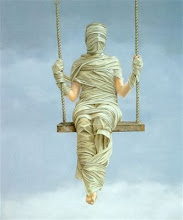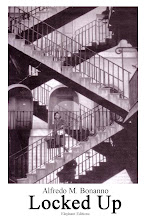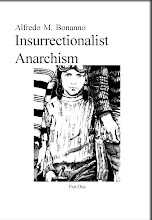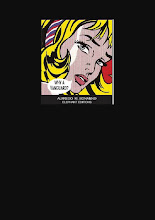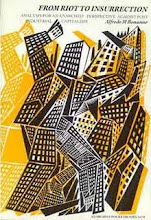Facerias was one of those men that it almost comes naturally to write a biography about. All the essential elements of the
legendary anarchist are to be found in his actions, his life as a whole and his death: the vendicator who rises up in struggle against the
class enemy and refuses to accept any compromise. And this is certainly one way to read the volume we are presenting here, the first
and, if you like, the least useful one.
Many anarchists have struggled and are still struggling today with the same irreducable spirit of counterposition that
characterised the life of Facerias or Sabate or the thousand other guerilla fighters who fell while continuing the armed struggle against
Francoism even after the fall of the Republic. And for many of them other books could have been written, dedicated not so much to a
method or revolutionary position as to the will of the individual who insurges when everyone else keeps quiet fearfully awaiting signs of
better days to come.
Yet this first aspect of the question does not seem enough to me. Or rather, to tell the truth, it no longer seems to me to be
enough. There was a time, twenty years ago, when what we could call the primary, essential analysis i.e. the analysis aimed at
underlining the great courage of the actions and proposing them as examples to be followed seemed to me to be sufficient. I am now
convinced that this propedeutica condition is no longer enough. One would run the of risk of falling into agiografia.
We need to say more today. Not so much about the responsibility of those who indirectly favoured repression by putting
obstacles in the way of the revolutionary work of comrades such as Facerias in favour of political perspectives which defended the line of
parties or the remainders of the conventicles of resistance; so much as concerning the very concept of antifascism and its retarding
effect on the revolutionary struggle, and which was open to interpretation in a way that made it difficult to use clearly in an anarchist
perspective of the destruction of power.
The Spanish civil war and the inheritance that its tragedy left the European and world political left, certainly did not create the
ideal atmosphere for clarifying such problems. Antifascism seemed, and continued to seem for decades to come, the common ground upon
which to base revolutionary collaboration. The anarchist organisations which supported the activity of Facerias or Sabate abroad -
because the problems were the same for these two comrades as for many others - also, and I would say essentially, had an antifascist
perspective, one that was to give life to a counterposition capable of programming the return of the Republic to Spain. So they could
support the actions of comrades who went into Spain to foment revolt, but they could not in any way support the actions of these
comrades when they took place in situations such as those in France or Itay, where by definition fascism was not in power.
Two kinds of problem derived from this strange concept of revolutionary struggle as intended by the institutional organisations of
Spanish anarchism abroad and the considerable number of non Spanish organisations with positions similar to those of anarcho-
syndicalism, both forieri of incomprehension and equivocation. In the first place the call for a generic collaboration in the name of anti-
fascism, regardless of any proper analysis of the positions proposing intervention in the struggle. In fact, the positions of Facerias and
Sabate were never object of serious examination, no discussion or debate ever took place. And Facerias himself never went beyond a
generic desire to see all the groups that did not share the positions of the Spanish FAI or the CNT organised federatively . Secondly, the
same generic and unclear agreement justified isolation and boycotting when their initiatives threatened to extend beyond Spanish fascism
labelled as francoism, and strike any State structure, in that any State is an enemy for the exploited, fascist or not as its constitution
might be.
And if the struggle were to continue, this could count on the autonomous decisions of the few comrades who wanted to carry
on and who found themselves obliged to face and resolve all the problems that arose without any external support, when they did not find
themselves faced with an actual web of slander and obstacles put in their way.
In such cases there are two kinds of problem to be faced. Whoever finds themselves fighting almost alone has to face the
problem of self-financing their struggle. And this can only be faced by going and taking money from where it is to be found, usually in
banks or in jewellers' shops. In order to resolve this let us say instrumental aspect one must give oneself a technical apparatus which is
the same as that usually used in the struggle against objectives of a more declaredly and easily identifiable political qualification. And
there are not a few cases where the two problems became intermingled like a snake uselessly trying to bite its own tail. Self-financing
was aimed at supplying oneself with means for the struggle. But at times this became so complicated as to run the risk of becoming the
aim of the struggle and no longer just one of the means. If to this we add the fact that, isolated from a real mass movement one was
obliged to think of everything, up to the smallest move, safe houses, procuring arms, etc, one can get an idea of the gigantic efforts
made by these men each day without the least hope of getting not only help but even understanding by so many indoctrinated knowalls,
devoted to nitpicking doubts from the comfort of their armchairs.
For Facerias to rob banks in Spain was one thing, but for him to have the nerve to do the same thing in Italy to the damage of
the Vatican Bank, for example, was different. Of course, one could always gloss over it with the thought that his ultimate aim was always
antifascism, but I don't believe that many saw this activity favourably in Italy apart from a few comrades who have never shut their eyes
to the real problems of the revolutionary clash.
On the other hand, it does not appear there were many who saw no difference between between Spanish banks and Italian
ones, concluding that the struggle against Spanish fascism was to begin and carry on with the struggle against all States and all national
capital, in the name of freedom, not in the name of the substitution of a fascist regime with a democratic one.
The Spanish equicocation demonstrates with great clarity today so many years later, how it was possible at that time to find
comrades prepared to involve themselves in armed struggle, but anything but prepared to agree that this struggle spread in a truly
anarchist sense, i.e. beyond the immediate objective of first Spanish fascism, then the Greek form, and so on. In recent times many of
those so-called comrades in struggle lost no time in declaring their unavailability to support any concept of struggle which did not limit
itself to being against this or that fascism but tried to analyse and therefore strike the very expression of power as it was changing and
manifesting itself historically throughout the years. In this case, there no longer being the alibi of fascism which always sounded like a
moral alibi, many let themselves be overcome by doubt and often ended up asking themselves if there was really a time to attack and if
there was not another way to carry out the political struggle against power, a struggle if which if not exactly reformist was at least
capable of taking account of the repressive degrees which a democracy is basically always capable of proposing to its opposers.
And many of these doubters became and and still are, the flagwavers of the struggle of Facerias, Sabate and many others
precisly because they want to wrap their struggle up in a nice book and relegate it to the long list of those who knew how to sacrifice
themselves in the war against fascism, a lost war but one which could also have been won.
Our reading of this book dedicated to Facerias, just like the preceding one which Tellez dedicated to Sabate, is different. These
comrades were anarchists and revolutionaries, not just generic antifascists. For them the struggle against francoism was just a starting
point, and the defeat of fascism would have been anything but a conclusion of that struggle. They would never stated that with
democracy in power there was no reason to continue the struggle, they would simply have singled out the new enemies and continued to
strike them.
And why be surprised? What other role could anarchists have?
Catania 6 April, 1994
Alfredo M. Bonanno
skip to main |
skip to sidebar

Some writings of Alfredo Maria Bonanno in English, or almost

Alfredo Bonanno was arrested on October 1st 2009 in Greece, accused of concourse in robbery. With him, anarchist comrade Christos Stratigopoulos.
Here are a few translations and part translations of a small portion of Alfredo's writing. This is a work in progress, many of the translations are as yet incomplete. Open links to find more of Alfredo's work.
Alfredo Bonnano Released
Nov. 22 Alfredo Bonnano was sentenced to 4 years imprisonment (which practically means that with the time served so far and the fact that he is over 70years old HE IS RELEASED
Christos Stratigopoulos (who took responsibility for the action)
was sentenced to 8 years and 9 months with the Greek law will probably be released at the end 2011
BY ANY MEANS NECESSARY
LINKS
click on any of these labels to read text
- "Community" sickness
- 1981 - Editorial
- A Critique of Syndicalist Methods
- A few notes on Sacco and Vanzetti
- A few notes on the revolutionary movement in Italy
- A little man in Singapore
- A million jobs
- A question of class
- Affinity
- After Marx autonomy
- Albania Laboratory of Subversion (Introduction)
- Anarchism and the national liberation struggle
- Anarchists and action
- AND WE WILL ALWAYS BE READY TO STORM THE HEAVENS AGAIN (Against amnesty)
- ANTI-INSTITUTIONAL MOVEMENT
- Are we modern?
- Armed Joy
- ARMED STRUGGLE. SOME REFLECTIONS.
- Autonomous base nuclei
- beyond syndicalism
- Beyond workerism
- But what is the imaginary?
- Class War
- Comiso - Organizational document of the self-managed leagues
- Considerations on illegality
- Dissonances (Introduction)
- Elephant Editions 1986
- Excluded and included
- Farewell to claiming
- Feral Revolution (Introduction)
- FICTITIOUS MOVEMENT AND REAL MOVEMENT
- For an Antiauthoritarian Insurrectionist International - Proposal for a debate
- From riot to insurrection
- From the centre to the periphery
- Good technology
- Guerilla Extraordinary
- Habits and idols
- Hegel
- I know who killed chief superintendent Luigi Calabresi
- Illegality
- Illness and capital
- Informal organisation
- Insurrection
- Internationalism
- Introduction to Sabate
- Introduction to Anarchism and Violence
- Introduction to Bratach Dubh English edition of Malatesta's Fra Contadini
- Introduction to Insurrectionalist Anarchism
- Introduction to Strange Victories
- Introduction to The Conquest of Bread
- Involuntary aspects of voluntary work
- Let's destroy work
- LET'S DESTROY WORK. New introduction
- Let's keep our feet on the ground please
- Lightening Conductors and Stand-ins - more shots of non-news
- Lightning Conductors and Stand-ins
- Lightning Conductors and Stand-ins (cont.)
- Locked up
- Looking forward to self-management
- Loss of language
- More on internationalism
- National Liberation Struggle
- nineteen years on
- No more crises
- Non-news about drugs
- Non-news about racism
- Ode to the Uniform
- On Feminism
- One's life on the line
- Order and chaos
- Otto Ruhle (Introductory Note)
- OUR ROLE IN THE PRESENT CONFLICT
- Palestine mon amour
- Pantagruel anarchist review
- Pinelli
- Prison and Prisoners’ Struggles - Introduction
- Propulsive Utopia
- Quality and the factory
- Restructuring Capital and the new democracy
- Revolution - Violence - Antiauthoritarianism
- REVOLUTIONARY VIOLENCE
- Science and the social revolution
- Self-management
- Severino Di Giovanni in Argentina 1923-1931 by Osvaldo Bayer
- Social banditry
- SOME NOTES -
- Space and Capital
- Stirner
- Stop the City? From information to attack
- Strategy and Methods
- Streamlined production
- The "end" of the crisis
- The aesthetics of anarchism
- The anarchist tension
- The area of autonomy and the anarchist movement in Italy
- The armed wing of science
- The Cruise missile base at Comiso can be prevented
- The ethical bank
- The insurrectional project
- THE LANGUAGE OF TECNICS -
- The logic of insurrection
- The moral split
- THE NECESSARY DESTRUCTION -
- The priority of practice
- The refusal of arms
- The revolutionary project
- The revolutionary struggle
- The significance of an insignificant event
- The struggle for self-managed social space
- The tyranny of weakness
- The whole and the part
- The young in a post industrial society
- Theory and action
- Towards anarchist antimilitarism
- TOWARDS THE GENERALISATION OF ARMED STRUGGLE
- TRANSFORMATION IN THE WORLD OF WORK AND SCHOOL -
- TRUTH -
- Unemployment in Italy - How come everything doesn't explode?
- Untitled
- Violence and non-violence
- What are anarchists
- What can we do with anti-fascism?
- Why a vanguard?
- Why Insurrection
- World domination in a few words

